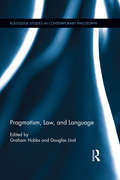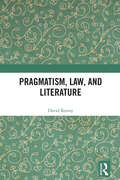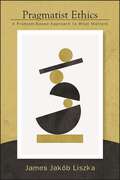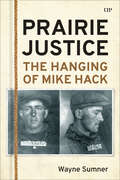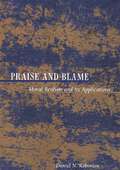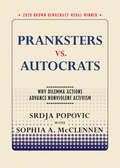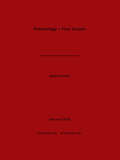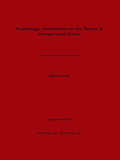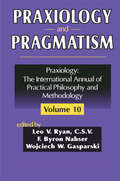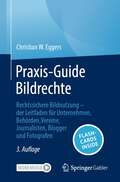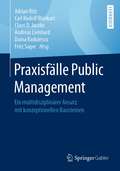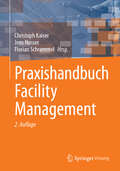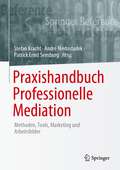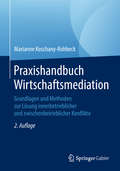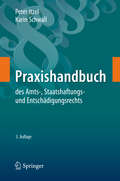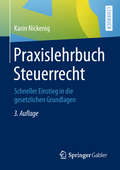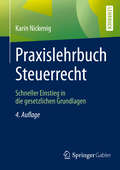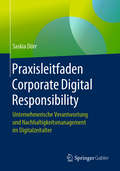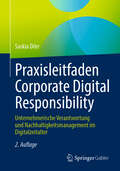- Table View
- List View
Pragmatism, Law, and Language (Routledge Studies in Contemporary Philosophy)
by Graham Hubbs Douglas LindThis volume puts leading pragmatists in the philosophy of language, including Robert Brandom, in contact with scholars concerned with what pragmatism has come to mean for the law. Each contribution uses the resources of pragmatism to tackle fundamental problems in the philosophy of language, the philosophy of law, and social and political philosophy. In many chapters, the version of pragmatism deployed proves a fruitful approach to its subject matter; in others, shortcomings of the specific brand of pragmatism are revealed. The result is a clearer understanding of what pragmatism has meant and can mean across these tightly related philosophical areas. The book, then, is itself pragmatism in action: it seeks to clarify its unifying concept by examining the practices that centrally involve it.
Pragmatism, Law, and Literature
by David KennyThis book uses literary examples to make the case for understanding law and the legal system through the lens of philosophical pragmatism.For pragmatists, experience is everything; they argue against understanding the world through any abstraction, maintaining that it is simply too complicated to fit into categories or theories. Legal pragmatism is the application of this philosophy to the making of law, the practice of law, and the practice of judging. This book maintains that the best way to understand legal pragmatism is not through bare theoretical exegesis but through literature: that is, through stories that cast light on various pragmatic aspects of law. Engaging a range of literary sources, including works by Seamus Heaney, Hilary Mantel, Harper Lee, and Ian McEwan, the book makes a compelling case for the contemporary relevance of pragmatism.This book will appeal to legal theorists, law and literature/humanities scholars, readers of literary criticism, and those with interests in pragmatist philosophy.
Pragmatist Ethics: A Problem-Based Approach to What Matters (SUNY series in American Philosophy and Cultural Thought)
by James Jakób LiszkaGrounded in American pragmatism, Pragmatist Ethics proposes a rethinking of ethics. Rather than looking to the good—a concept for which consensus is difficult to achieve—pragmatists instead advocate for tending to the problems of the day. James Jakób Liszka examines how daily practices and institutions are originally conceived and then evolve to solve certain problems, and that their failure to do so is the source of most problems. Liszka argues that the ethical goal, therefore, is to improve upon these practices and that the sort of practical reasoning that characterizes practices can be enhanced by a more scientific, empirical approach. But how do we know when changes to practices and institutions are progressive? Problems will plague the best of communities; the better community is the one that succeeds best at solving its problems. Pragmatist Ethics examines various accounts of improvement and progress, concluding that the problem-solving effectiveness of communities is the key to progressive changes.
Prairie Justice: The Hanging of Mike Hack (Osgoode Society for Canadian Legal History)
by Wayne SumnerIn May 1928, the body of George Edey was discovered on his Saskatchewan farm, leading to the swift arrest of a deaf and mentally disabled farmhand named Mike Hack. Following a three-day murder trial, Hack was quickly convicted and sentenced to death. Denied clemency, in January 1929 he was hanged in the courtyard of the Regina Jail at twenty-seven years of age and buried in an unmarked grave. Prairie Justice dissects this case, revealing its implications for important themes in the history of the Canadian criminal justice system. Wayne Sumner meticulously traces the narrative of the case, analysing each step from the initial murder investigation to the subsequent arrest, trial, conviction, denial of clemency, and execution of the man accused. Drawing on a personal connection to the case rooted in his family history – his father’s hometown was the village where the crime occurred, and both his grandfather and great-grandfather were involved in the investigation – Sumner uncovers deeper and more universal reasons to share the story. The book punctuates the narrative with insightful analysis on key criminal justice themes illustrated by the case: unfitness to stand trial, the defence of insanity, ineffective assistance of counsel, wrongful conviction, and miscarriage of justice. Ultimately, Prairie Justice exposes how access to justice can be merely illusory for the poor and marginalized.
Praise and Blame: Moral Realism and Its Applications (New Forum Books #27)
by Daniel N. RobinsonHow should a prize be awarded after a horse race? Should it go to the best rider, the best person, or the one who finishes first? To what extent are bystanders blameworthy when they do nothing to prevent harm? Are there any objective standards of moral responsibility with which to address such perennial questions? In this fluidly written and lively book, Daniel Robinson takes on the prodigious task of setting forth the contours of praise and blame. He does so by mounting an important and provocative new defense of a radical theory of moral realism and offering a critical appraisal of prevailing alternatives such as determinism and behaviorism and of their conceptual shortcomings. The version of moral realism that arises from Robinson's penetrating inquiry--an inquiry steeped in Aristotelian ethics but deeply informed by modern scientific knowledge of human cognition--is independent of cognition and emotion. At the same time, Robinson carefully explores how such human attributes succeed or fail in comprehending real moral properties. Through brilliant analyses of constitutional and moral luck, of biosocial and genetic versions of psychological determinism, and of relativistic-anthropological accounts of variations in moral precepts, he concludes that none of these conceptions accounts either for the nature of moral properties or the basis upon which they could be known. Ultimately, the theory that Robinson develops preserves moral properties even while acknowledging the conditions that undermine the powers of human will.
Pranksters vs. Autocrats: Why Dilemma Actions Advance Nonviolent Activism (Brown Democracy Medal)
by Srdja Popovic Sophia A. McClennenThe Lawrence and Lynne Brown Democracy Medal, presented by the McCourtney Institute for Democracy at Penn State, recognizes outstanding individuals, groups, and organizations that produce innovations to further democracy in the United States or around the world. The 2020 Brown Democracy Medal winner, Srdja Popovic, was a leader in the revolution that brought down the Milošević regime in Serbia and he contin-ues to help protestors around the world learn effective, sometimes humorous, nonviolent tactics. In 2020, he teamed up with Sophia A. McClennen to study the concept of "dilemma actions," which offers a structured, strategic approach to fighting back against authoritarianism, as well as for defending democracy.
Praxeology - Four Essays
by Adam KnottPraxeology - Four Essays is a short book about praxeology by Adam Knott. Topics covered include: The nature of exact law, the distinction between praxeology and economics, the structure of action, the nature of interpersonal action, the fundamental categories of consciousness, epistemological problems in Mises's praxeology, the subjective nature of scarcity, the concept of value in Misesian praxeology, the nature of coercion, the relationship between the law of marginal utility and praxeology, and others.
Praxeology Introduction to the Theory of Interpersonal Action
by Adam KnottA praxeological theory of interpersonal action. This theory is a proposed extension of Misesian praxeology into the realm of direct, person-to-person social interaction.
Praxeology Why Are We Libertarians?
by Adam KnottA work in praxeology. This short essay explores the epistemological approach to social science, and advances a theory in which social phenomena are conceived in terms of consciousness categories.
Praxiology and Pragmatism
by F. NahserVolume l0 in this distinguished series addresses two distinct but interrelated philosophical movements, which exemplify different approaches to the study of ethics. Praxiology, an unique Central European philosophical movement, embraces the study of purposeful and conscious action and the elements essential to each action, act, and causative act. Pragmatism, an uniquely American philosophical movement, was founded by Charles S. Peirce and William James, and is based on the meaning of conceptions, defined in their practical bearings that guides actions and measures them by practical consequences of belief. The chapters in this volume are grouped in a section on Praxiology and one on Pragmatism. Each section defines the historical origins of their respective philosophical movements, describes their methodology, and interrelates their impact on "human conduct" and contemporary society. The section on Praxiology presents for the first time in English a seminal study, "The ABC of Practicality," written in l972 by Tadeusz Kotarbinski, the father of modern Polish praxiology. Wojciech W. Gasparski offers an interpretative analysis of Praxiology. Daryl Koehn explores the nature of practical judgment and Timo Airaksinen applies praxiological efficiency in professional ethics. The section devoted directly to Pragmatism includes scholarly contributions by eight academics on the relevance of pragmatism to management (Juan Fontrodona), business ethics (Sandra Rosenthal), law ( Fred Kellogg), and pragmatic inquiry (F. Byron Nahser). The contribution of Max Scheler to pragmatism (Manfred Frings) and the influence of William James on business ethics(Dennis McCann) are groundbreaking contributions to the study of pragmatism. The volume also includes a teaching model for a classroom application of pragmatism (Jack Ruhe), and concludes with an evaluation of the renaissance of interest in pragmatism in Europe (Jacek Sojka). Leo V. Ryan, C.S.V., professor of management, DePaul University, is past president of the Society for Business Ethics. He is co-editor of Human Action in Business (Vol. 5) and Business Students Focus on Ethics (Vol. 8) of the Praxiology series. F. Byron Nahser is chairman and CEO, Globe Group, Chicago, the originator of Pathfinder Pragmatic Inquiry Method and author of Learning to Read the Signs: Reclaiming Pragmatism in Business. Wojciech W. Gasparski is professor of humanities at the Institute of Philosophy and Sociology, the Polish Academy of Sciences, Warsaw, and editor-in-chief of the Praxiological series. He has published numerous volumes and over two hundred articles and conference papers.
Praxis-Guide Bildrechte: Rechtssichere Bildnutzung – der Leitfaden für Unternehmen, Behörden, Vereine, Journalisten, Blogger und Fotografen
by Christian W. EggersDieser Praxis-Guide ist ein ungemein hilfreicher Ratgeber, um das komplexe Thema Bildrechte gut verstehen zu können. Zugleich kann das Buch fallbezogen als Nachschlagewerk im Alltag dienen.Auf Basis der Gesetzeslage (DSGVO, KUG, UrhG, UrhDaG, u.v.m.) erhalten Sie Antworten zu den häufigsten Fragen der rechtskonformen Verwendung von Bildmaterial. Das Buch ist für Nicht-Juristen geschrieben, die im Marketing, der Öffentlichkeitsarbeit, als Fotografen, Blogger oder Bildrechtemanager arbeiten. Im Fokus stehen die typischen Anwendungsfälle der digitalen Publikation von Fotos, Videos, Logos, Animationen, Designs und Grafiken. Mit vielen Bildbeispielen, Praxisfällen, Leitsätzen und Checklisten werden die rechtlichen Fragestellungen einfach und verständlich beantwortet. Kritische Punkte Ihres Handelns werden so für Sie schnell erkennbar.Die dritte Auflage wurde vollständig aktualisiert und erweitert (u.a. Recht auf Vergessenwerden, Fotografie mit Kamera-Drohnen, KI-Bilder, aktuelle höchstrichterliche Entscheidungen zur DSGVO, Urheberrechts-Diensteanbieter-Gesetz, …).Auszug aus dem Inhalt – Know how u.a. zu …Personenfotos veröffentlichenVerwendung von KI-BildernUmgang mit Architektur- und Sachaufnahmen sowie mit geschützten Produkten, Logos, Markennamen und DesignsBilder für Internetpublikationen (Social-Media-Redaktion, Blogs, etc.) Sorgfaltspflichten bei der Verwendung fremder BilderDie passende Lizenz erwerben sowie Lizenzvergabe mit Creative-Commons-LizenzenOnline-Service mit Muster-Dokumenten (Einwilligungserklärungen, Verträge, …)On top: Testen Sie Ihr Wissen mit Fragen und Antworten zum Buch mit Springer Nature Flashcards.
Praxisfälle Public Management: Ein multidisziplinärer Ansatz mit konzeptionellen Bausteinen
by Claus D. Jacobs Adrian Ritz Fritz Sager Andreas Lienhard Carl Rudolf Blankart Doina RadulescuDieses Lehrbuch präsentiert eine multidisziplinäre Fallstudiensammlung zum Public Management. Die 30 Praxisfälle basieren auf realen Ereignissen und repräsentieren aktuelle Aspekte der Verwaltungsführung, zu deren ergebnis- und handlungsorientierter sowie kritischer Betrachtung der Leser angeregt wird.Der erste Teil des Buches besteht aus den Praxisfällen, die nach sechs Themenfeldern geordnet sind. Nach der Fallbeschreibung folgen jeweils Aufgaben und Literaturhinweise zur Lösung des Falls. Der zweite Teil enthält die theoretisch-konzeptionellen Bausteine, welche das Hintergrundwissen für die Lösung der jeweiligen Fallstudie bereitstellen. Dozierende finden zudem ausformulierte Lösungsskizzen auf der Website des Buches auf springer.com.
Praxishandbuch Facility Management
by Florian Schrammel Christoph Kaiser Jens NusserDieses in zweiter deutlich erweiterter Auflage erschienene Fachbuch ist ein Nachschlagewerk zu sämtlichen Themen der Bewirtschaftung, des Betriebs und der Verwaltung von Gebäuden, die dem Facility Manager bei seiner täglichen Arbeit begegnen. Der besondere Schwerpunkt liegt dabei auf rechtlichen und betriebswirtschaftlichen Fragestellungen sowie auf Nachhaltigkeitsthemen. Der Aufbau des Buches orientiert sich an einem klassischen Ablauf im Facility Management-Prozess. Der Leser findet zu Beginn eines jeden Kapitels eine fundierte und verständliche Einführung in die Thematik, kann aber bei speziellen Fragestellungen auch gezielt nachschlagen. Zahlreiche Beispiele und Praxistipps an den relevanten Stellen runden das Werk ab.
Praxishandbuch Professionelle Mediation: Methoden, Tools, Marketing und Arbeitsfelder
by André Niedostadek Stefan Kracht Patrick Ernst SensburgDas Praxishandbuch Professionelle Mediation ist nicht nur eine umfassende Hilfestellung für die Mediationspraxis, sondern zugleich auch ein strukturiertes Handbuch zum vertieften Einarbeiten in eine Vielzahl einzelner Aspekte. Umfasst sind alle wichtigen Bereiche der Mediation. Diese werden in rund 70 Beiträgen durch ein interdisziplinäres und hochkarätig besetztes Team von Autorinnen und Autoren abgedeckt. Dabei steht die Mediationspraxis ganz im Fokus: Erfahrungen, Tipps und Beispiele sichern die Umsetzung in die eigene Praxis. Das Buch behandelt Methoden, Prinzipien, Techniken und Arbeitsgebiete,hilft bei der Durchführung einer Mediation,unterstützt bei der Positionierung und Akquise,vermittelt das nötige Basiswissen (auch zu neueren Anwendungsformen der Mediation, wie z.B. die Online Mediation oder Cross-Over Mediation),enthält zusätzlich Checklisten und sonstige hilfreiche Hinweise.Zudem erhalten Praktiker ausführliche Informationen zu wichtigen Fragen wie der Honorierung oder ethisch richtigem Verhalten. Informationen zu den Ausbildungsanforderungen in den unterschiedlichen Bereichen runden das Buch ab, ebenso wie die Darstellung der unterschiedlichen rechtlichen Rahmenbedingung in den verschiedenen Grundberufen. Zielgruppen: Mediatoren, die bereits in der Praxis tätig sind bzw. Anwälte, Sozialpädagogen, Psychologen, Therapeuten, Ärzte, Sozialarbeiter, Richter, Juristen in Wirtschaft und Verwaltung oder andere Mediationsinteressierte, die sich Mediation als Arbeitsfeld erschließen wollen.
Praxishandbuch Wirtschaftsmediation: Grundlagen und Methoden zur Lösung innerbetrieblicher und zwischenbetrieblicher Konflikte
by Marianne Koschany-RohbeckDas praxisorientierte Handbuch beschreibt umfassend das Verfahren der Wirtschaftsmediation als nachhaltige und ökonomisch sinnvolle Konfliktmanagementstrategie zur Lösung innerbetrieblicher sowie zwischenbetrieblicher Auseinandersetzungen. Neben den Grundlagen werden Konfliktkompetenzen, neue Erkenntnisse aus dem Verhandlungsmanagement sowie die Kommunikations- und Moderationstechniken, die in der Wirtschaftsmediation zum Einsatz kommen, dargestellt. Darüber hinaus werden die rechtlichen Aspekte der Mediation sowie die Anforderungen an einen Mediator beschrieben. Die einzelnen Phasen des Mediationsverfahrens werden ausführlich erklärt und durch Praxisbeispiele veranschaulicht. Abschließend werden die sehr hohen Konfliktkosten thematisiert, die ein Hauptargument dafür liefern, Wirtschaftsmediation im Unternehmen zu etablieren. Checklisten, Fragebögen und Vertragsmuster machen das Buch zu einem idealen Begleiter für Mediationsprozesse im Unternehmen. Es berücksichtigt die Ausbildungsbestimmungen der Verordnung über die Aus- und Fortbildung von zertifizierten Mediatoren (ZMediatAusbV), die 2016 von der Entwurfs- in die nun gültige Verordnung übernommen wurden, und ist damit für den Einsatz in der Lehre hervorragend geeignet.
Praxishandbuch der Kreislauf- und Rohstoffwirtschaft
by Peter Kurth Martin Faulstich Anno OexleDie traditionell vielschichtige Abfallwirtschaft entwickelt sich mit der ihr eigenen Dynamik zur Kreislauf- und Rohstoffwirtschaft. Im vorliegenden Handbuch werden erstmalig alle wesentlichen Aspekte dieses Wirtschaftssektors – fachübergreifend und interdisziplinär – behandelt. Neben den in der Ressourcenwirtschaft relevanten rechtlichen Fragestellungen (u. a. Stoffrecht, Verwaltungsrecht, Haftung und Transport) sind die unterschiedlichen Stoffströme dargestellt (z. B. Glas, Papier, Verpackung, Metalle und Elektronik-Altgeräte, Bioabfälle) sowie Anlagentechnik und Logistik beschrieben (Abfallwirtschaftssysteme, Abfallbehandlung, Deponierung). Bei der Auswahl der Themen und Autoren lag der Schwerpunkt auf Praxisrelevanz und Praxisbezug.
Praxishandbuch des Amts- und Staatshaftungsrechts
by Peter Itzel Christoph Stein Karin SchwallIn dem Handbuch werden alle relevanten Anspruchsgrundlagen und Problemfelder bei schädigendem Verhalten der öffentlichen Hand (Bund, Länder und Gemeinden mit allen Untergliederungen) verständlich, umfassend und systematisch dargestellt. Erläutert werden Ansprüche aus Amts- und Staatshaftung wie auch aus Enteignung, Aufopferung sowie sonstige Ersatz- und Ausgleichsansprüche. Der Band orientiert sich vorwiegend an der höchst- und obergerichtlichen Rechtsprechung und liefert Hinweise auf entsprechende Regelungen in Europa und in anderen Ländern.
Praxishandbuch des Amts-, Staatshaftungs- und Entschädigungsrechts
by Peter Itzel Karin SchwallIn dem Handbuch werden alle relevanten Anspruchsgrundlagen und Problemfelder bei schädigendem Verhalten der öffentlichen Hand (Bund, Länder und Gemeinden mit allen Untergliederungen) verständlich, umfassend und systematisch dargestellt. Erläutert werden Ansprüche aus Amts- und Staatshaftung wie auch aus Enteignung, Aufopferung sowie sonstige Ersatz- und Ausgleichsansprüche. Der Band orientiert sich vorwiegend an der höchst- und obergerichtlichen Rechtsprechung und liefert Hinweise auf entsprechende Regelungen in Europa und in anderen Ländern.
Praxislehrbuch Steuerrecht: Schneller Einstieg in die gesetzlichen Grundlagen
by Karin NickenigDieses Praxislehrbuch bietet einen leichten und nachvollziehbaren Überblick über die gesetzlichen Grundlagen der Einkommen-, Umsatz-, Gewerbe- und Körperschaftssteuer für den unternehmerischen Alltag, in dem Existenzgründer, Selbstständige und kaufmännische Angestellte täglich mit steuerrechtlichen Fragen und Herausforderungen konfrontiert werden. Die neu erworbenen oder aufgefrischten Kenntnisse werden mithilfe zahlreicher Beispiele, Kontrollfragen und Übungen mit detaillierten Lösungen vertieft. So gewinnen Kleingewerbetreibende und Jungunternehmer den nötigen Einblick in die für sie relevanten steuerlichen Zusammenhänge und entschlüsseln das Fachvokabular von Behörden und Steuerberatern. Die 3. Auflage wurde sorgfältig durchgesehen, aktualisiert und optimiert.
Praxislehrbuch Steuerrecht: Schneller Einstieg in die gesetzlichen Grundlagen
by Karin NickenigDieses Praxislehrbuch bietet einen leichten und nachvollziehbaren Überblick über die gesetzlichen Grundlagen der Einkommen-, Umsatz-, Gewerbe- und Körperschaftssteuer für den unternehmerischen Alltag, in dem Existenzgründer, Selbstständige und kaufmännische Angestellte täglich mit steuerrechtlichen Fragen und Herausforderungen konfrontiert werden. Die neu erworbenen oder aufgefrischten Kenntnisse werden mithilfe zahlreicher Beispiele, Kontrollfragen und Übungen mit detaillierten Lösungen vertieft. So gewinnen Kleingewerbetreibende und Jungunternehmer den nötigen Einblick in die für sie relevanten steuerlichen Zusammenhänge und entschlüsseln das Fachvokabular von Behörden und Steuerberatern. Die aktualisierte 4. Auflage wurde auf den Rechtsstand Sommer 2019 gebracht.
Praxisleitfaden Corporate Digital Responsibility: Unternehmerische Verantwortung und Nachhaltigkeitsmanagement im Digitalzeitalter
by Saskia DörrDie Digitalisierung transformiert rasant die globale Wirtschaft – mit neuen Problemen für Individuen, Gemeinschaft und den Planeten. Doch was bedeutet dies praktisch für unternehmerische Verantwortung und Nachhaltigkeitsmanagement? Dieses Buch beschreibt fundiert, wie sich Unternehmensverantwortung im Zeitalter von Big Data und Künstlicher Intelligenz verändert und wie Corporate Digital Responsibility zu einem nachhaltigen Wettbewerbsvorteil für Unternehmen im digitalen Wandel führen kann. Es liefert Verantwortlichen in Unternehmen einen umfassenden Leitfaden, wie sie die innovativen Aspekte professionell in der Praxis umsetzen können und versetzt sie in die Lage, den Unternehmenserfolg im Zuge der Digitalisierung gesellschaftlich verantwortlich zu gestalten.Sie erfahren, welche „unerwünschten Nebenwirkungen" die Digitalisierung hat und wie sich Unternehmensverantwortung verändert.Sie können den Status der Corporate Digital Responsibility im Unternehmen bestimmen.Sie sind in der Lage, eine Strategie der Digitalverantwortung zu entwickeln und Managementinstrumente gezielt zur Umsetzung einzusetzen.Sie meistern die Herausforderungen im dynamischen Markt- und Gesellschaftsumfeld und erzielen Wirkung. Best-Practice-Beispiele von namhaften Pionierunternehmen helfen dabei, einen eigenen Weg zu finden.Dieser Leitfaden ist eine Einladung an Führungspersönlichkeiten in Unternehmen, Corporate-Responsibility-Verantwortliche, Nachhaltigkeitsberater und alle Interessierten, die Möglichkeiten einer verantwortungsvollen Digitalisierung kennenzulernen und selbst unternehmerisch auszugestalten. Er bildet einen gut strukturierten Einstieg in das noch junge Fachgebiet des Managements und der Unternehmensführung.
Praxisleitfaden Corporate Digital Responsibility: Unternehmerische Verantwortung und Nachhaltigkeitsmanagement im Digitalzeitalter
by Saskia DörrDieses Buch beschreibt fundiert, wie sich Unternehmensverantwortung im Zeitalter von Big Data und Künstlicher Intelligenz verändert und wie Corporate Digital Responsibility (CDR) zu einem nachhaltigen Wettbewerbsvorteil für Unternehmen im digitalen Wandel führen kann. Es liefert Verantwortlichen in Unternehmen einen umfassenden Leitfaden, wie sie die innovativen Aspekte professionell in der Praxis umsetzen können und versetzt sie in die Lage, den Unternehmenserfolg im Zuge der Digitalisierung gesellschaftlich verantwortlich zu gestalten. Die überarbeitete und erweiterte 2. Auflage wurde um neue Inhalte zur praktischen Umsetzung von CDR, zum digital verantwortlichen Führen und zum verantwortlichen Umgang mit Künstlicher Intelligenz ergänzt. Es gibt einen umfassenden Überblick über aktuelle CDR-Rahmenwerke und -Initiativen sowie neue Erkenntnisse zu CDR-Messung, -Berichterstattung und -Benchmarking.
Praxisleitfaden Immobilienanschaffung und Immobilienfinanzierung
by Guido RennertDer Praxisleitfaden ist für alle diejenigen geschrieben, die in Deutschland eine (kreditfinanzierte) Immobilie kaufen oder selbst bauen wollen. Der Autor stellt das Thema anschaulich und leicht verständlich dar, wobei er prägnant und detailliert sowohl an rechtliche als auch an wirtschaftliche Fragestellungen heranführt. Die Inhalte werden anhand von Beispielen mit konkreten Berechnungen und Bezügen zur aktuellen Rechtslage illustriert. Das Berechnungs-Tool hilft bei der Ermittlung der tatsächlichen Kosten einer Kreditfinanzierung.
Praxisleitfaden Kommunales Beteiligungsmanagement
by André TegtmeierSie versorgt uns mit Wasser, Energie, Mobilität, Wohnraum und vielem mehr: die Kommunalwirtschaft. Oft ausgelagert als privatrechtliches Unternehmen, bildet sie das Rückgrat unserer Gemeinden. Eine aktive Unternehmenssteuerung durch die Kommune und ein effizientes Beteiligungsmanagement sind daher von hoher Bedeutung. Schließlich sollen die Unternehmen nicht nur wirksam und sparsam wirtschaften, sondern auch einen engen Kontakt mit dem kommunalen Gesellschafter halten.Ziel dieses Leitfadens ist es, interessierten Leserinnen und Lesern in Verwaltung, Politik, Wissenschaft und Kommunalwirtschaft das Leistungsspektrum des modernen Beteiligungsmanagements näherzubringen. Durch die Vorstellung der Instrumente soll auch kleineren Kommunen die Möglichkeit eröffnet werden, ihr Beteiligungsmanagement individuell zu verbessern.Seit ihrer Gründung im Jahr 1993 bietet die Beratungsgesellschaft für Beteiligungsverwaltung Leipzig mbH (bbvl) der Verwaltung und der Politik wirksame Unterstützung bei der Steuerung des städtischen Beteiligungsvermögens. Die vielfältigen Lösungen, Instrumente und Prozesse, die die bbvl entwickelt hat, bilden die Grundlage für diesen Praxisleitfaden.
Praxisleitfaden Online-Kurs: Kurse auf digitalen Plattformen rechtssicher erstellen und vermarkten
by Esther-Maria RoosDieses Buch vermittelt einen praxisorientierten Zugang zu den rechtlichen Themen, die bei der Erstellung und dem Vertrieb von Onlinekursen wichtig sind. Von der Konzeption der Inhalte über die verschiedenen Vertriebsmodelle bis hin zur Planung eines rechtssicheren Launches auf unterschiedlichen Wegen erläutert die Autorin die wesentlichen Fragestellungen und bietet leicht umsetzbare Lösungsansätze. Checklisten, Projektpläne und Formulare helfen dabei, den (ersten) eigenen Onlinekurs rechtssicher auf den Weg zu bringen.Das Buch richtet sich an alle, die ihr Spezialwissen erstmalig auf Online-Plattformen anbieten möchten. Seien es Trainer, Lehrende, Coaches oder Expertinnen und Experten für besondere Themen. Es ist auch dann interessant, wenn ein bestehender Kurs überarbeitet oder professionell vertrieben werden soll.
